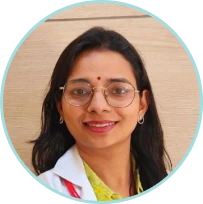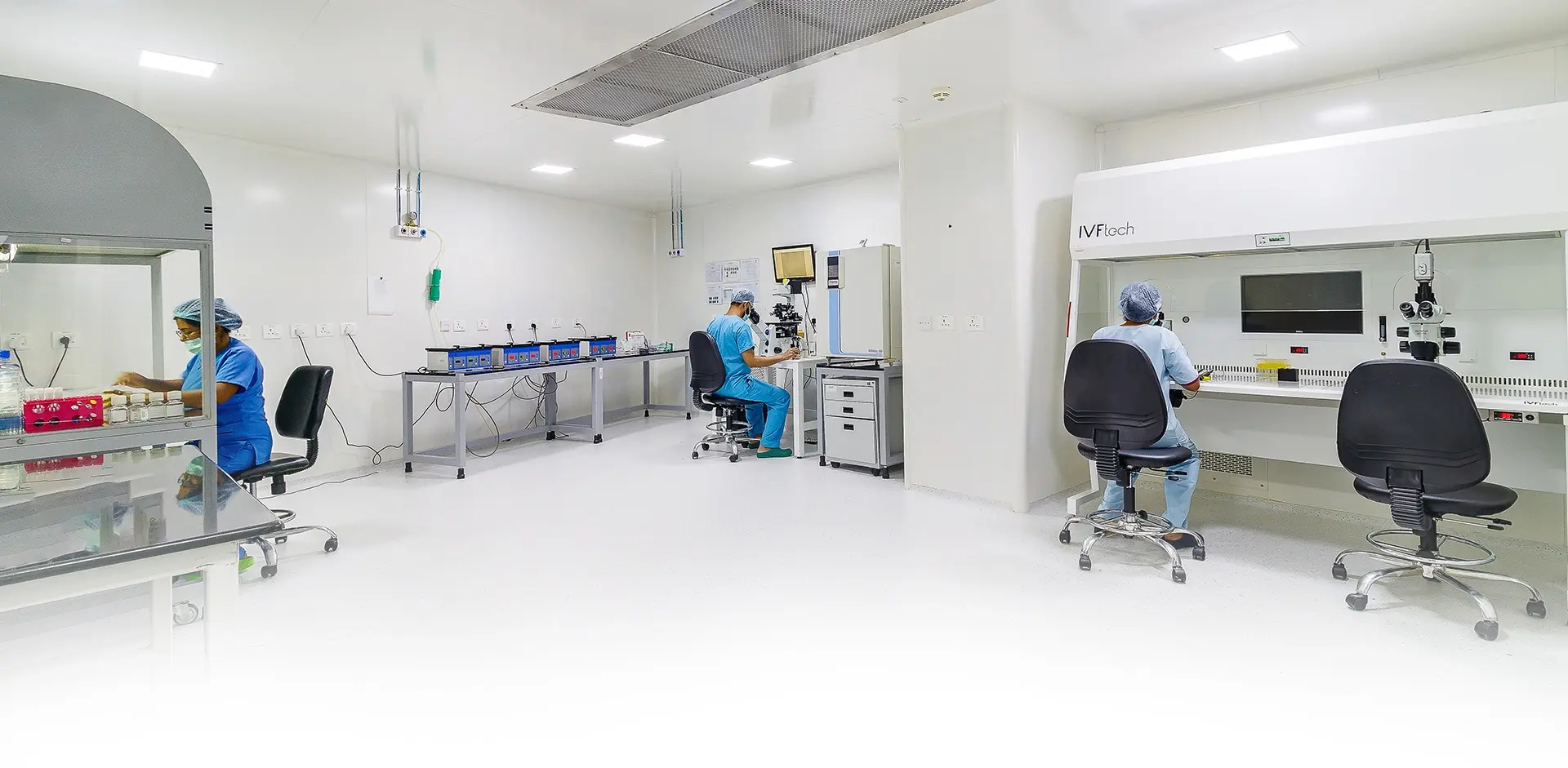
IVF Clinic in Indirapuram
Today, Delhi-NCR has emerged as a leading destination for patients worldwide, primarily due to its advanced technology, state-of-the-art infrastructure, and expertise. Patients seeking medical treatments prefer Delhi-NCR because it is equipped with renowned super speciality hospitals and specialised clinics that provide a wide range of intricate surgeries and personalised treatment strategies.
Across India, Nova IVF Fertility has a track record of over 85,000+ successful IVF pregnancies, which is proof of our expertise and extensive experience. Each of the six Nova IVF Fertility centres in Delhi-NCR region offers is committed to maximise your chances of conception. At Nova IVF Indirapuram centre in Delhi-NCR, our team is exclusively dedicated to supporting individuals grappling with fertility-related challenges, inquiries, or uncertainties. Also, at the Indirapuram facility, our highly skilled team of reproductive endocrinologists, infertility specialists, nurses, and lab professionals, are committed to providing the highest level of reproductive facilities to their patients.
Services Offered
The team at IVF centre in Indirapuram is dedicated to addressing the specific circumstances of our patients. The inhouse team of physicians, fertility experts, and staff work collaboratively to provide superior medical treatment with innovative technology, fostering an environment that prioritises a holistic approach to patient care.
Nova IVF Fertility centre offers a suite of the following services:
 Own Egg Pregnancy
Own Egg Pregnancy Female Infertility Assessment
Female Infertility Assessment Male Infertility Assessment
Male Infertility Assessment Semen Analysis
Semen Analysis  Intra - uterine Insemination (IUI)
Intra - uterine Insemination (IUI)  In-vitro Fertilisation (IVF)
In-vitro Fertilisation (IVF)  Intracytoplasmic Sperm Injection (ICSI)
Intracytoplasmic Sperm Injection (ICSI)  Pre-genetic Testing (PGT)
Pre-genetic Testing (PGT)  Testicular sperm aspiration (TESA)
Testicular sperm aspiration (TESA)  Percutaneous Epididymal Sperm Aspiration (PESA)
Percutaneous Epididymal Sperm Aspiration (PESA)  Cryopreservation
Cryopreservation Why Choose Nova IVF treatment in Indirapuram?
Located in Indirapuram, the Nova IVF centre provides a comprehensive range of investigations, treatments, and services designed to provide you with a personalised and supportive approach at every stage of your IVF journey.
Access To The Best Fertility Specialists:
With a cumulative experience of decades, our fertility clinic grants you access to accomplished experts who will instil confidence and assurance in your fertility diagnosis and subsequent treatment, ensuring that you receive the highest level of care and expertise throughout your journey to parenthood.
Patients Come First:
Patients come first at Nova IVF Indirapuram centre. Here, our team provides the best fertility care, from maintaining the highest medical and scientific standards, to supporting you through every stage of your journey to parenthood. We prioritise a close partnership with you, endeavouring to understand your unique circumstances, identify any challenges, and collectively determine the best course of action, while providing unwavering support and guidance. Our goal is to work together with you in making your dream of starting a family a reality, with a compassionate and individualised approach every step of the way.
GALLERY
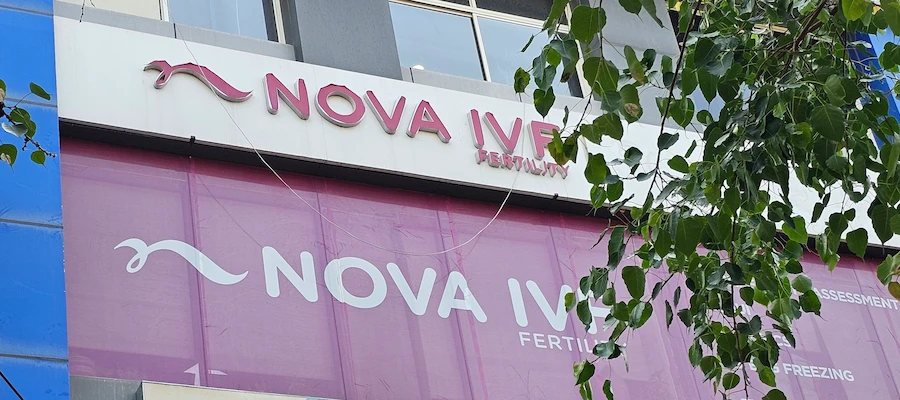

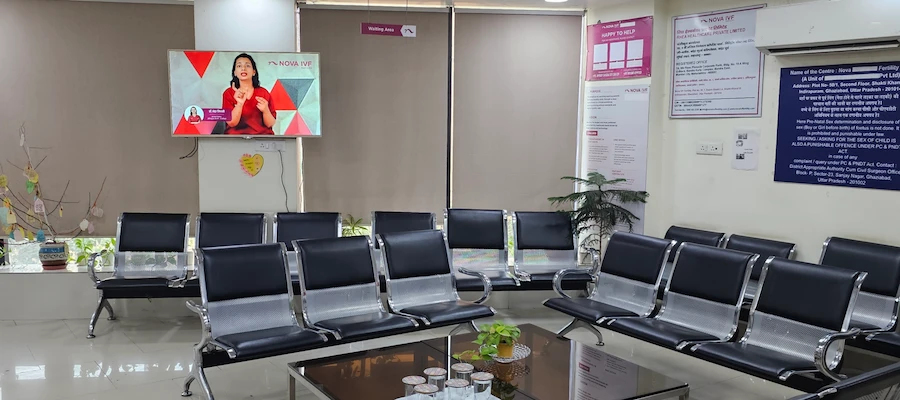

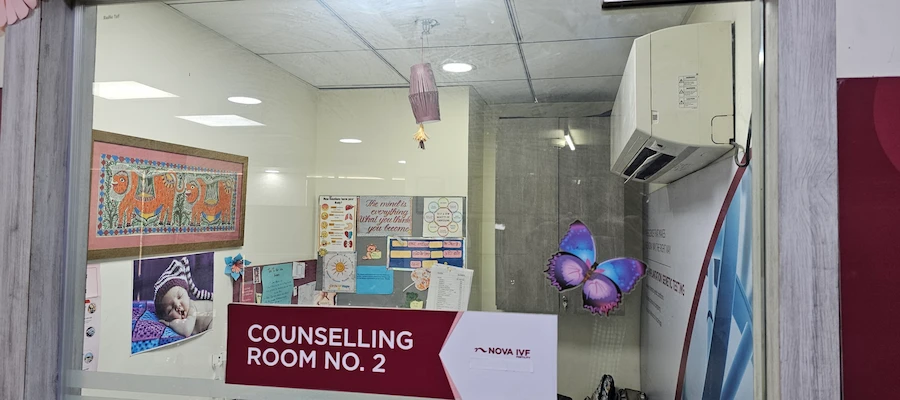
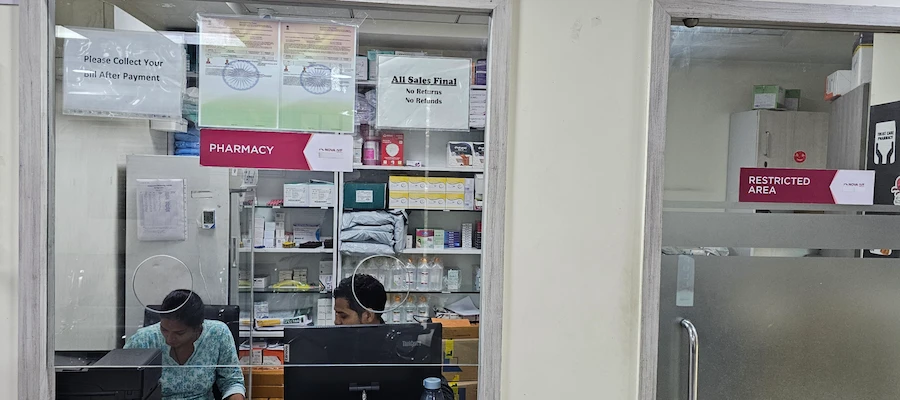
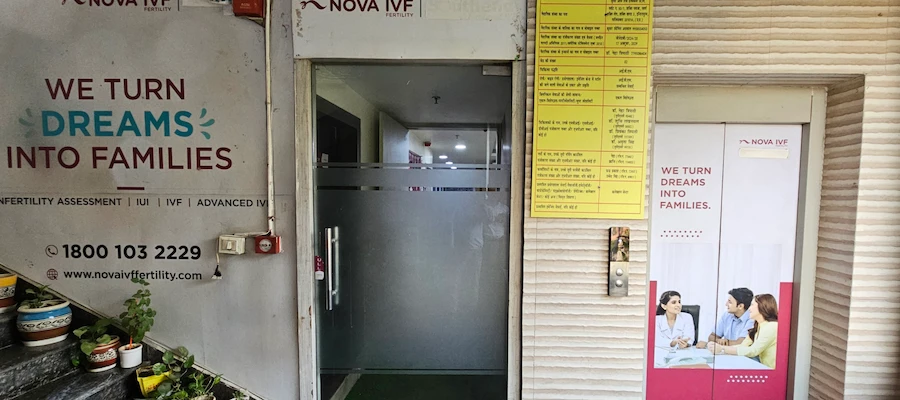
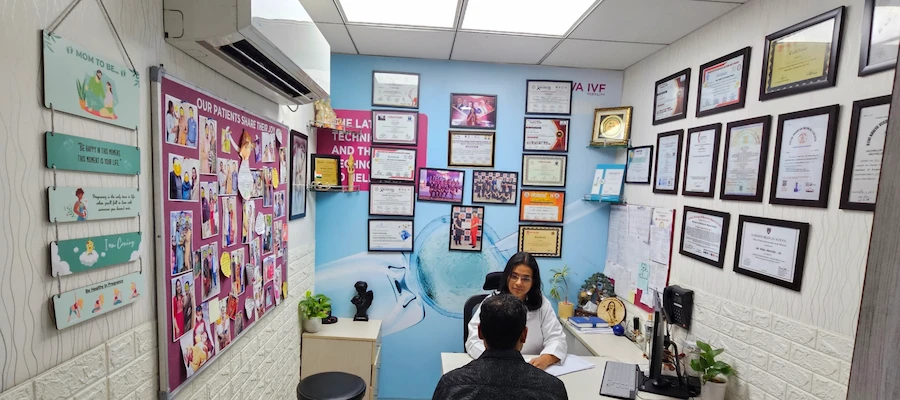
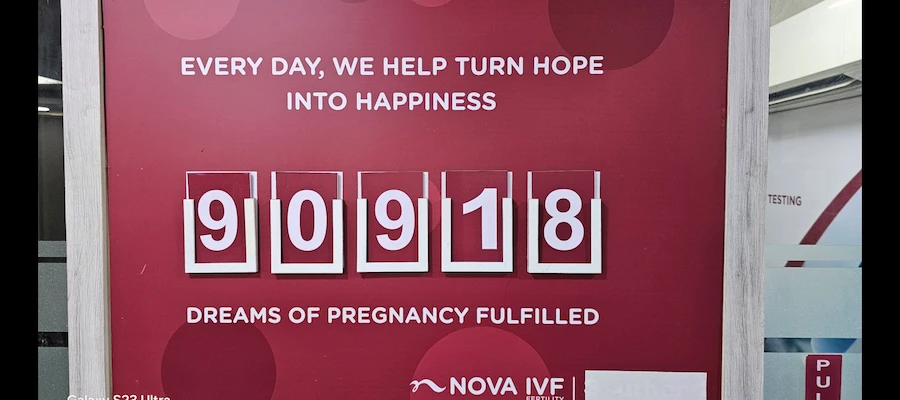
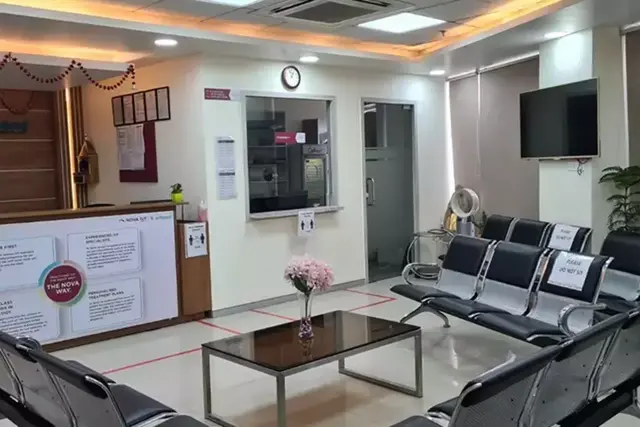
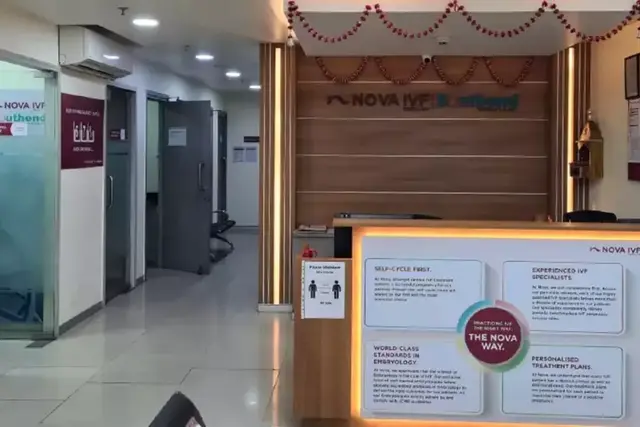
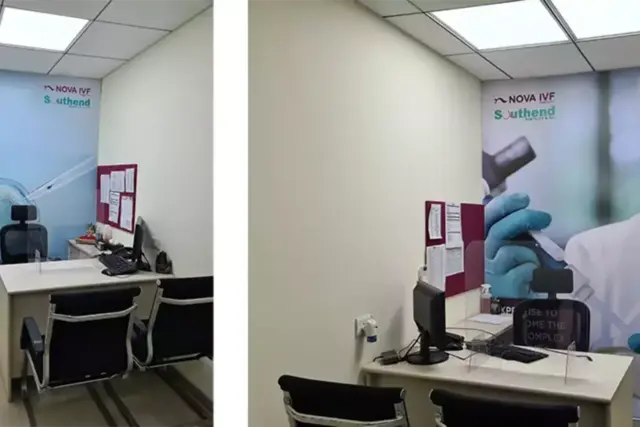
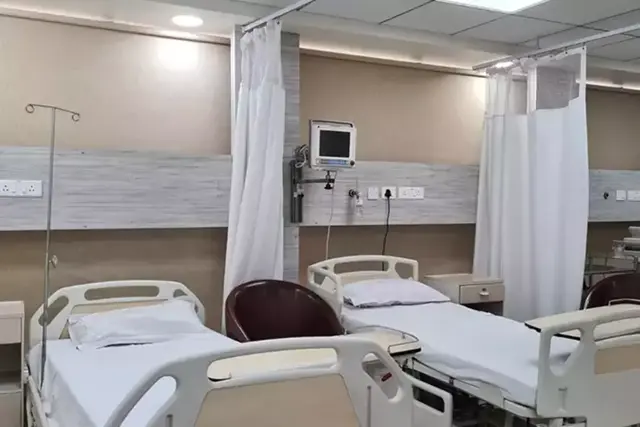
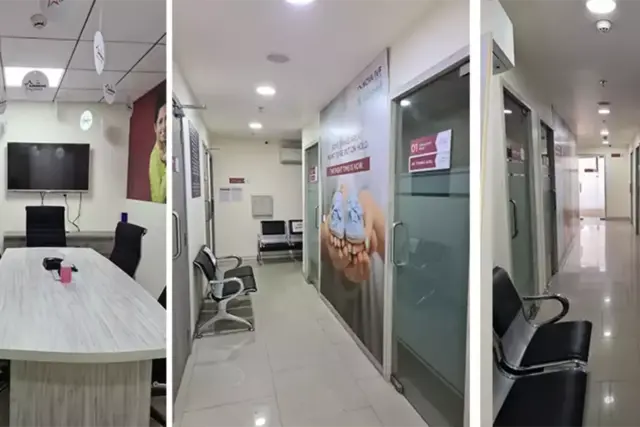
Take your first step towards
parenthood with India’s
Award winning fertility chain.
Need help? Talk to our fertility experts.
08049388781Maximise your chances of pregnancy
Find an IVF SpecialistPlot No: 50/1, Shakti Plaza, Shakti Khand-III, Indirapuram, Uttar Pradesh 201014
Frequently Asked Questions
Here are some signs that indicate the right time to consult a fertility specialist:
- Irregular Periods: Women with a history of irregular periods, might have PCOD (Polycystic Ovarian Disease) or Polycystic Ovary Syndrome (PCOS), which makes natural conception difficult.
- Pelvic Pain: Missed periods or heavy periods with pelvic pain, you could have endometriosis or an intrauterine fibroid.
- Thyroid Issues: Thyroid problems can also affect your menstrual cycle and ovulation
- Age Factor: As a woman over 35, your egg reserve may decrease. This can impact fertility and your chances of getting pregnan
- Unsuccessful Attempts: If you're under 35 and have been trying to conceive for over a year without success
- Low Sperm Quality: As a male, if you have been diagnosed with low sperm count or poor sperm qualit
- Low sex drive: if you or your partner are experiencing low sex drive, and the male is unable to sustain an erection, you may need to consult a urologist.
Early consultation with a fertility expert will allow you to get timely attention and explore potential treatments to treat the underlying conditions, so that you can take the next step to start a family.
Nova IVF Fertility centre a multi-award-winning fertility chain of clinics with 68 centres in 44 cities across India. In NCR-Delhi, they have six centres located in Gurugram, Indirapuram, Noida, Rajouri Garden, Vasant Vihar, and with an OPD IVF clinic in Dwarka.
Nova IVF fertility operates between 9 a.m. to 6 p.m. from Monday to Sunday. We are closed on public holidays. To consult a Nova IVF Fertility specialist, book an appointment at 08049388781 during working hours.
The cost of IUI can vary from hospital to hospitals and also the location of the clinic. Typically, the cost of a single intrauterine insemination (IUI) cycle can begin from Rs 9,000. Other variables like medicines, the medical conditions, and the type of treatment selected can also affect the final estimate.
The cost of an IVF treatment cycle can start from Rs 99,000. The precise cost, however, may vary based on your chosen course of treatment and the need of additional tests like pre-implantation genetic screening tests. You can ask the centre staff for details about the expenses of treatment.
The minimum cost of Intracytoplasmic Sperm Injection (ICSI) in India can range between Rs. 1,70,000 to Rs. 2,30,000 per cycle. ICSI is performed in numerous cycles, each of which has extra fees that the patient must pay independently. The price only covers the conventional procedures and methods that your fertility experts will specify. Other specialty tests that you may want to have while receiving treatment may not be included in the price.
Usually, a Preimplantation Genetic Testing for Aneuploidies (PGT-A) test for each embryo can cost over Rs.17,000. The cost of the diagnosis is determined per embryo by genetic laboratories. And if the number of embryos to be biopsied increases, the costs also increase, and vice-versa. PGT-A is a procedure wherein a tissue sample from the embryo are examined for irregular chromosome numbers and genetic diseases before the IVF embryo transfer.
When you choose the best IVF centre in Indirapuram, you will be partnering with experts who will be dedicated to maximising your chances of becoming pregnant. Also, you have access to the latest cutting-edge, successful treatments offered experienced team of specialists to put you on the path to fertility.
The IVF center in Indirapuram centre provides the following benefits:
- Counselling: We offer emotional support to patients dealing with treatment-related challenges. This covers delays, failures, intensive procedures, waiting periods, and extended treatment decisions. We help you manage stress in both clinic and external situations through effective techniques. Our counselling caters to your specific needs during tough times, pregnancy after infertility, multiple pregnancies, and the conclusion of medical treatment.
- Advanced Procedures: The IVF centre in Indirapuram use latest diagnostics tools and methods like Pre-genetic screening (PGS), and Endometrial Receptivity Array (ERA). The centre provides advanced fertility procedures that incorporate cutting-edge techniques to improve your chances of a successful pregnancy. The centre is has also adopted Artificial intelligence (AI) technology in its inhouse lab, which also helps boost your outcome.
- Flexible Financing: Noone likes hidden costs. With a clear pricing structure, we provide treatment alternatives that are reasonably priced. This implies that throughout your journey with us, there won't be any unexpected deductibles or expenses. Also, we offer easy EMI alternatives to make fertility treatment more affordable for you.
There are various ways you can contact Nova IVF Fertility centres in Delhi-NCR. You can book an appointment at the best IVF centre in Indirapuram by an email to info@novaivffertility.com or call the Nova IVF Fertility at 08049388781 between 9 a.m. to 6 p.m. from Monday to Sunday. Alternatively, you can contact Nova IVF Fertility from the website directly. On the website home page, from the top menu, click ‘City’ and select ‘Delhi-NCR’ from the drop-down menu. The page will open to the Delhi-NCR centre page with 5 centre tabs. On the Indirapuram centre tab, you can click ‘Book Your Appointment’. On the ‘Book Your Appointment’ page, you must provide your details in the required fields that include your name, mobile and select the preferred centre of choice from the drop-down menu. Click ‘Confirm Appointment’.
Our customer service representatives will assist you in confirming the physicians' availability and scheduling an appointment. In addition, we will send you the center's address and a link to Google Maps via WhatsApp to facilitate navigation.
 Infertility Counselling
Infertility Counselling Female Infertility Treatment
Female Infertility Treatment Andrology Treatment
Andrology Treatment Fertility Enhancing Surgeries - Female
Fertility Enhancing Surgeries - Female Fertility Enhancing Surgeries - Male
Fertility Enhancing Surgeries - Male Endoscopy Treatment
Endoscopy Treatment IUI Treatment
IUI Treatment IVF Treatment
IVF Treatment ICSI Treatment
ICSI Treatment Advanced IVF Solutions
Advanced IVF Solutions Embryology
Embryology Vitrification Egg, Embryo, Sperm Freezing
Vitrification Egg, Embryo, Sperm Freezing Preimplantation Genetic Testing (PGT)
Preimplantation Genetic Testing (PGT) Donation Program Embryo / Egg / Sperm
Donation Program Embryo / Egg / Sperm Self-cycleTM IVF
Self-cycleTM IVF

 Self-cycleTM IVF
Self-cycleTM IVF